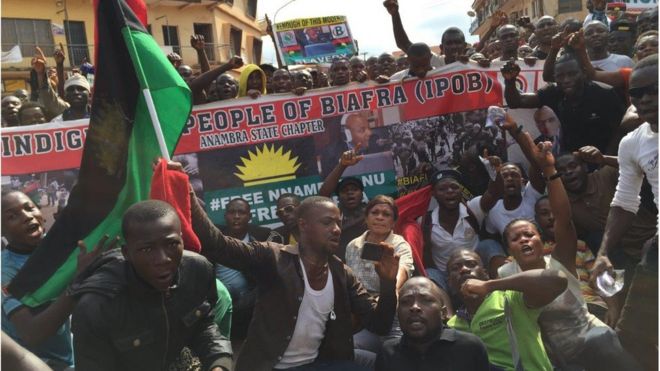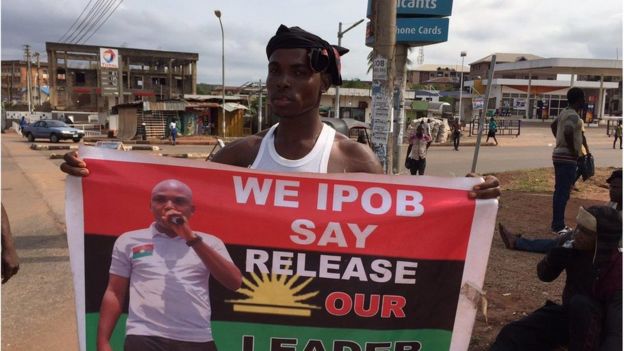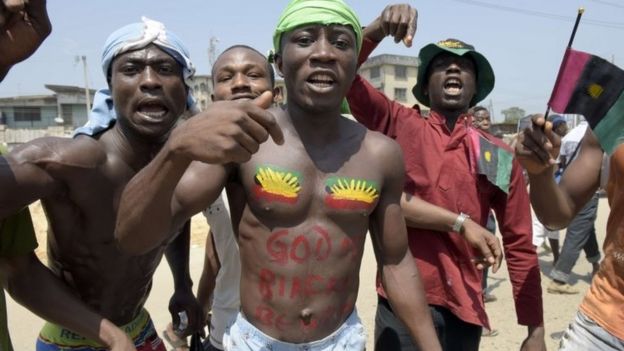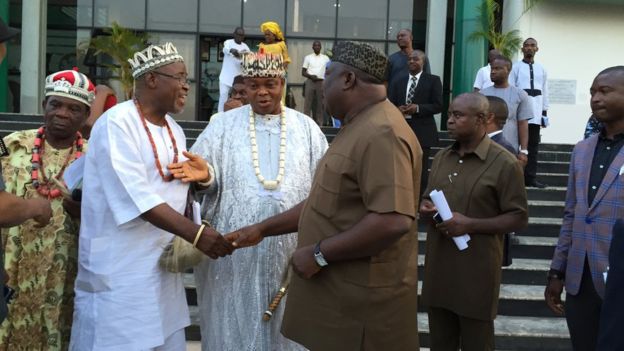
In our series of letters from African journalists, Mannir Dan Ali looks at the resurgence of a secessionist movement that supports the creation of a breakaway state of Biafra in Nigeria.
The last few weeks have seen thousands of young people trooping to the streets of southern Nigeria to protest about the continued detention of a leading Biafra activist, Nnamdi Kanu.
Both new and old media are full of views and reports on the renewed agitation for the short-lived Biafran republic.
If it is not the report of the latest city to host the noisy protest by the mainly ethnic Igbo young men under the banner of the Indigenous Peoples of Biafra (IPOB), it may be some hot exchanges on social media about the different interpretation of the event.
The Nigerian military's warning of dire consequences for anyone who tries to carry out what they refer to as treasonable acts, has also been getting attention.
Many Nigerians, with the deadly Boko Haram insurgency in their minds, are trying to understand what is going on, asking why now and what does it all mean?
The latest protests were triggered by the detention of Mr Kanu, the UK-based leader of the IPOB.
He came to Nigeria last month and was arrested by the authorities, accused of treason.

 AFP
AFP
Security sources say he was arrested for broadcasting hate speech both on the internet and through a banned London-based radio station called Radio Biafra, which he has been using to promote his call for the creation of a Biafran nation.
He has already appeared in court but is still under detention as his trial is yet to get off the ground.
Biafra at a glance:
- First republic of Biafra was declared by a Nigerian military officer Odumegwu-Ojukwu in 1967
- He led his mainly ethnic Igbos into a deadly three-year civil war that ended in 1970
- More than one million people lost their lives, mostly because of hunger
- Decades after Biafra uprising was quelled by the military, secessionist groups have attracted the support of many young people
- They feel Nigeria's central government is not investing in the region
- But the government says their complaints are not particular to the south-east
One of the most viewed items recently by people trying to understand what is going on is a video uploaded to YouTube showing Mr Kanu soliciting arms at a meeting of the World Igbo Congress in the US city of Los Angeles in September.
He said to his audience:
"We need guns and bullets from you people in America...
"In 1967, before the war started, there was a blood moon... and there is blood moon this year because we are going to be free - no matter what happens."
Now with raucous protesters calling for Mr Kanu's release, the security services are getting even more concerned.
A military chief said: "The Nigerian army would like to send an unequivocal warning to all and sundry, more specifically to all those threatening and agitating for the dismemberment of the country, committing treasonable felony and arson as well as wanton destruction of lives and property."
Mannir Dan Ali:
 Mannir Dan Ali
Mannir Dan Ali
"Most educated middle-class Igbos and other Nigerians who are hoping that common sense will prevail"
It is not only the security services who are concerned about the resurgence of sentiment for Biafra.
Many Nigerians cannot understand its logic because, as one commentator put it: The Igbo community, more than any other in Nigeria, has settled and is doing business in all parts of the country.
'Misunderstanding history'
Even at the conference where Mr Kanu made his incendiary call for arms, there were sceptics who pointed to recent events in South Sudan to show why secession may not be the answer to problems of disaffection and neglect.
A columnist with the Vanguard newspaper, who has made a career out of defending Igbo causes, Ochereome Nnanna, said in a recent article: "I see the agitators as people who do not understand the history of the defunct Biafra.
"I see them as people who misapprehend the Biafra they are asking for... Kanu and his multitude of blind followers must be told that they are playing into the hands of their enemies and dragging millions of other unwilling Igbos along."
This appears to be the position of most educated middle-class Igbos and other Nigerians who are hoping that common sense will prevail.
Community leaders in the Niger Delta where protests have also been taking place, have already disassociated themselves from the agitation, warning the protesters to stay clear of the oil-producing region.

Within Igboland, state governors met for the second time last weekend to agree a common approach to the matter.
But their effort was hampered by the refusal of some members of the pan-Igbo group Ohanaeze Ndigbo to attend the meeting.
However, they did set up a committee of elders to meet the Nigerian President Muhammadu Buhari on the issue.
They said they would ask the federal government to find ways of addressing the region's lack of infrastructure and development.
Mr Buhari, a former military ruler who fought in the civil war, will be watching the Igbo leaders' response to the issue with concern.
He has less than a month to go to meet his own deadline to end the Boko Haram Islamist insurgency that has devastated the north-east.
Many would argue that that conflict was not born out of religion, but by those disaffected by lack of opportunities and unemployment - precisely the issues that commentators believe are driving the young pro-Biafra protesters.
Members of the Igbo establishment now face the tricky task of trying to rein in the youthful protesters, none of whom experienced the trauma of the original Biafra, but who are so convinced that it represents their best hope of a better future.
No comments:
Post a Comment